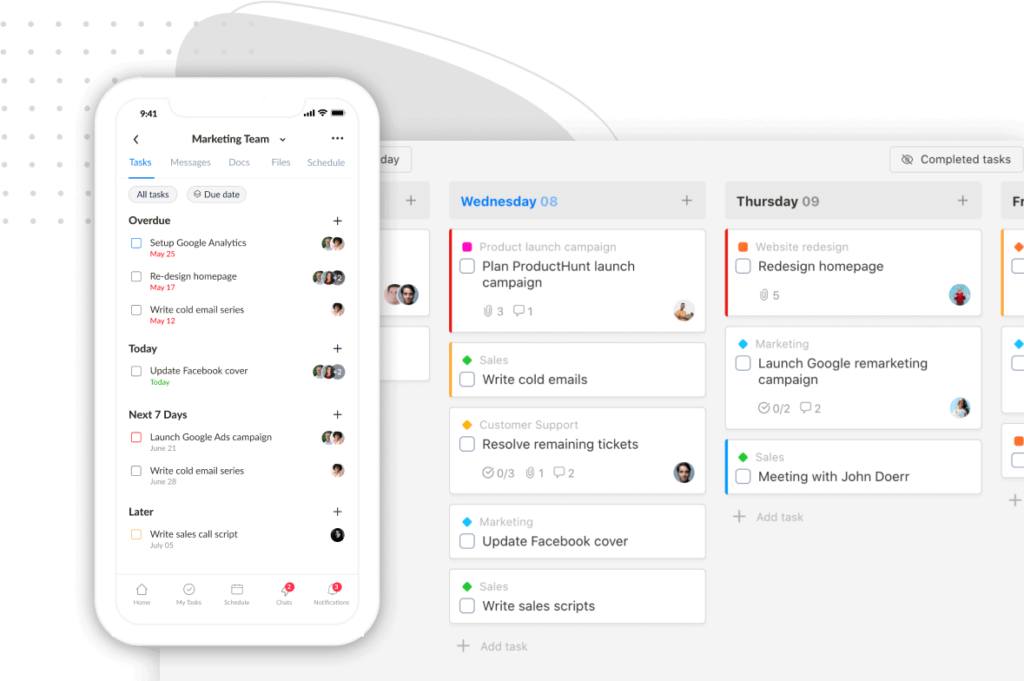Do you remember that blog post where I reviewed Motion? I mentioned that Motion is the pioneer in software with auto-scheduling capabilities.
Sadly, good fundamental ideas, but terrible execution.
The app actually gets laggier over time. Some handy features have been removed for some reason. The pricing is expensive for what it offers. And there’s no free version.
Interestingly, it’s not just me; many other Motion users have encountered similar frustrations.
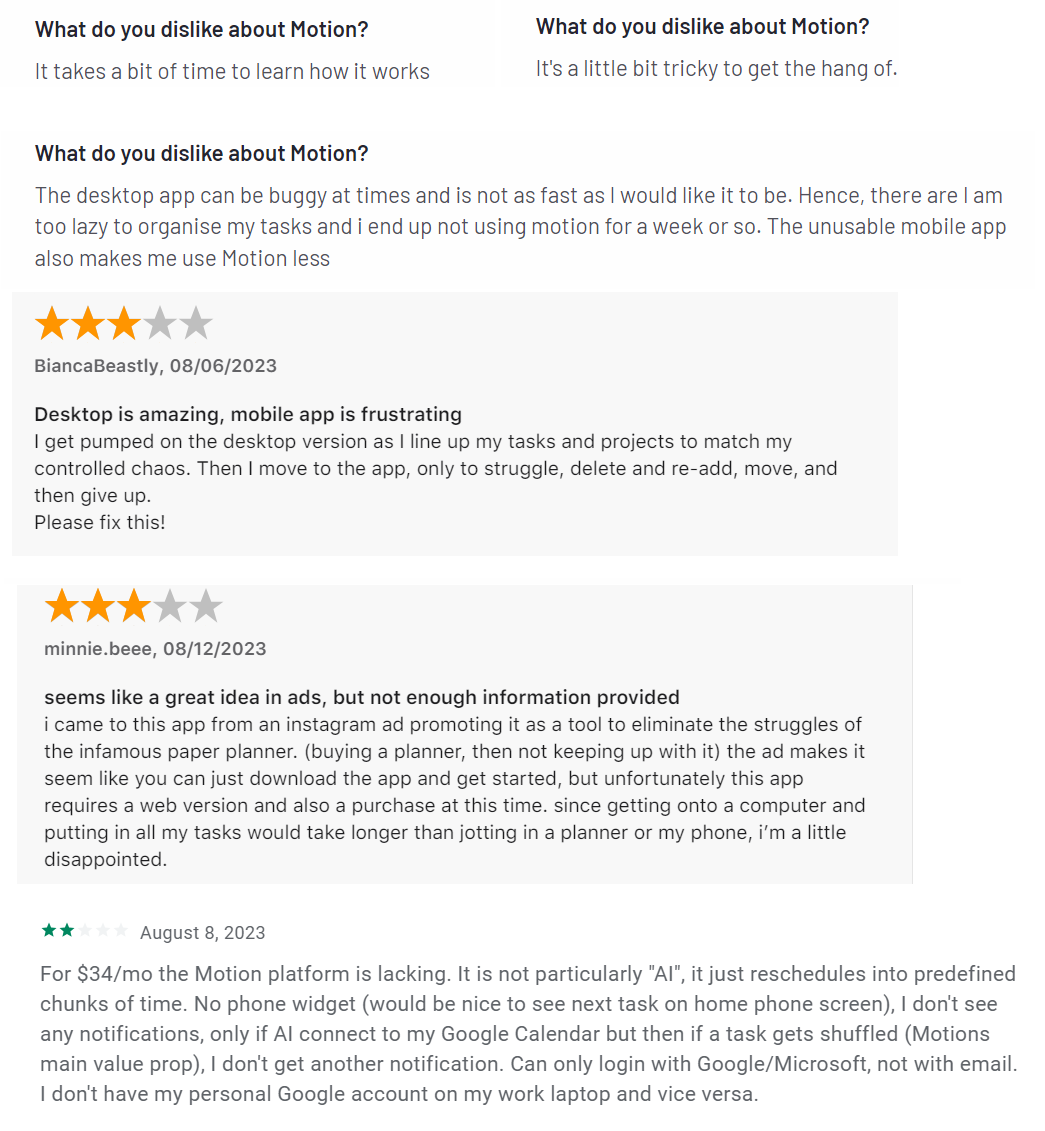
With this in mind, I’ve crafted this follow-up post as a solution: presenting the 11 best alternatives to Motion, each with its own strengths and functions.
So, whether you’re a Motion user actively seeking alternatives or simply a beginner in the early stage of exploring options before making a decision, welcome!
Why do people decide to leave Motion?
There are five common reasons for this:
1. Lack of essential features. Motion offers no monthly calendars or the function of multi-selecting to-dos for bulk action. The app has even removed some features with no replacement.

2. Steep learning curve. According to some user reviews, Motion is tricky to learn, especially its scheduling features. You’ll need to spend a lot of time playing around with the settings initially. And the app itself isn’t quite intuitive.
3. No free version. Instead, Motion offers you a limited 7-day free trial, but only after you give them your credit card information.
4. Sky-high pricing. Motion’s personal plan costs $19-$34/month, while the Team plan is priced at $12-$20/month. Many users consider this range overpriced for what the app truly offers.
5. Slow-loading and highly buggy design. Take a look!
11 Best Motion Alternatives to Better Manage Your Busy Schedule
1. Upbase
Like Motion, Upbase prioritizes efficiency. It’s just that Upbase achieves this differently.
Imagine an all-in-one project management app where you have everything—projects, tasks, calendar events—in one place.
But unlike Motion, this app is:
- Simple to use.
- Free to start, with unlimited users, tasks, and storage.
- 3x lower price range.
- Friendly for both individual users and teams.
Upbase offers a distinct separation between team and personal projects.
You can add your team members to take care of the company work without them seeing your solo projects and vice versa.
But the best part is:
You can customize the app to suit each project’s requirements, keeping the interface cluttered-free from unused features.
So, Upbase is best suited to those:
- Not in need of AI help.
- Seeking free apps like Motion, but with a friendlier design to work well for both individuals and teams.
Key features
In comparison, Upbase offers many of Motion’s features, and many more. Let’s take a look at this comparison table:
|
Comparing Upbase vs. Motion |
Upbase |
Motion |
|---|---|---|
|
Free plan |
✅ | |
|
Price | $5-$9/user per month (& lifetime deals for teams) |
$19-$34/user per month (no lifetime deals) |
|
List & Kanban view |
✅ |
✅ |
|
Task notes, priorities, deadlines, labels, subtasks, etc. |
✅ |
✅ |
|
Recurring tasks |
✅ |
✅ |
|
“My Tasks” page |
✅ |
✅ |
|
Daily & weekly calendar |
✅ |
✅ |
| Monthly Calendar |
✅ |
✅ |
|
Pomodoro timers |
✅ |
✅ |
|
Google Calendar sync |
✅ |
✅ |
|
Bookmark tool (private) |
✅ | |
|
Various collaboration tools: Docs, Files, Links, & Messages. |
✅ | |
|
Chat tool (support for 1:1, custom group, and project team chats) |
✅ | |
|
Auto-scheduling |
✅ | |
|
“Pin to Tray” function |
✅ | |
|
Notepad & Daily journal tool (private) |
✅ | |
|
Booking meetings |
✅ | |
|
Keyboard shortcuts |
✅ | |
|
Daily & weekly planner |
✅ | |
|
Monthly calendar |
✅ |
But the notable thing is: all these features are thoughtfully arranged in a logical and sensible way.
Take some examples.
A. “Schedule” page
Upbase’s Schedule page is far more robust than Motion’s.
It allows for scheduling tasks ahead by day, week, and month, with four views: 1) Daily Planner, 2) Weekly Planner, 3) Weekly Calendar, and 4) Monthly Calendar.
Therein, the Daily Planner view is intentionally designed for personal use. That’s why you’ll find in here a list of daily activities, a daily calendar view, and a combo of productivity features, including:
- Pomodoro timer—with ambient sounds to stay focused on work.
- Notepad—to capture quick thoughts, minimizing distractions.
- Daily Notes, aka a daily journal tool—to reflect on your work day and reduce stress.
Don’t worry, these features are hideable with a few simple clicks.
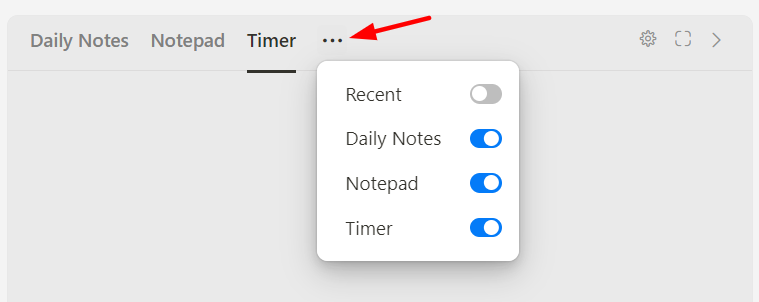
The best part is you can drag and drop your day-to-day tasks onto the calendar, then block time for them.
Now, let’s talk a bit about the Google Calendar integration.
Upbase allows you to connect multiple calendars to Upbase. Once connected, all the calendar events are synced to the day, week, and month calendar on the Schedule page.
Notably, these events will appear on the Upbase calendar with the same color as in Google Calendar—something hardly found in other tools.
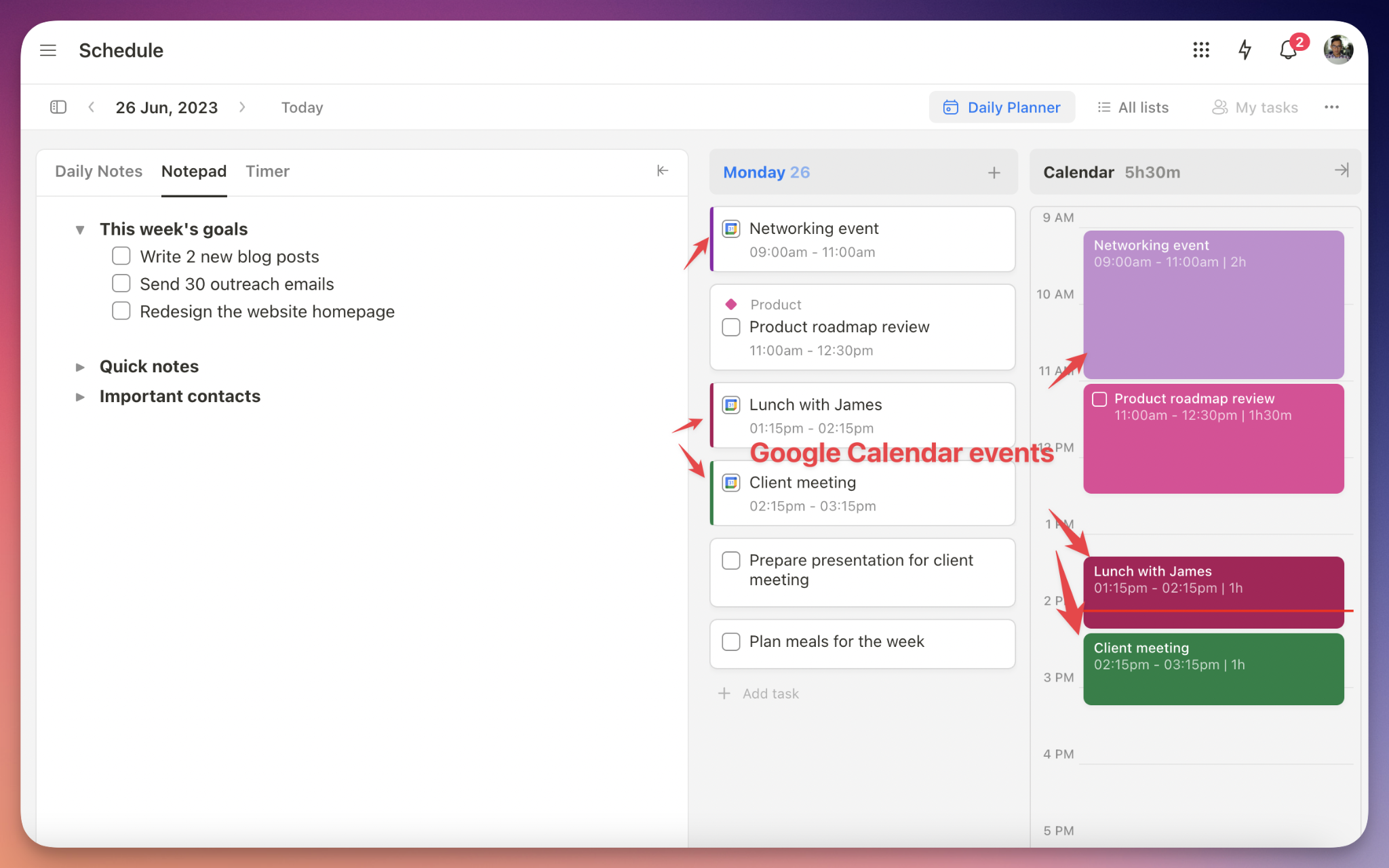
B. Project lists
Upbase’s project lists are a new take on project management!
They separate items—such as tasks, documents, files, links, calendars, messages, and team chats—from one project to another.
Not just so, Upbase allows you to flexibly customize project lists to your workflows.
For example, you can customize each project list’s color and icon. Duplicate lists, or organize them into folders. Or, you can hide the unused tools in each project list by a few simple clicks.
Pricing
This Motion app alternative is free to start, with a Premium plan that offers full features and priority support.
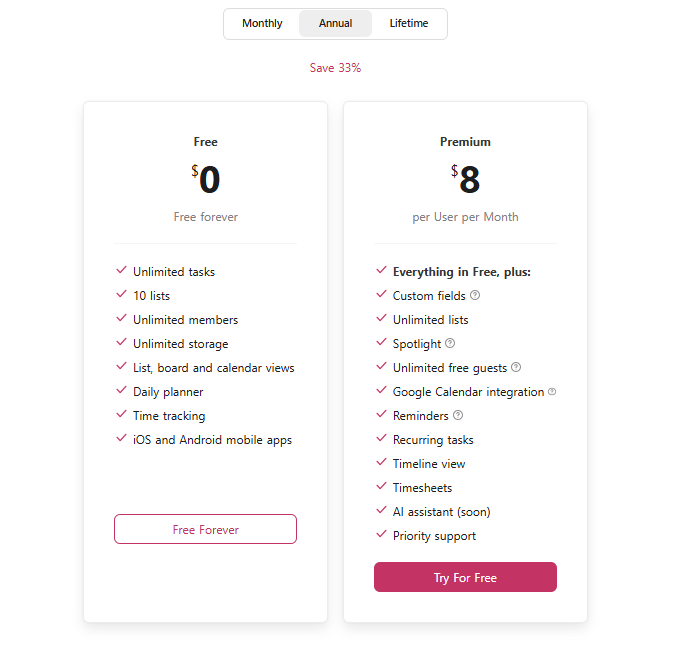
2. Asana
Asana is like an old friend in the world of project management tools.
When compared to Motion, Asana truly shines with its comprehensive feature set, tailor-made to smooth out project planning, track tasks, and make team collaboration feel like a breeze.
Without a doubt, it’s a game-changer for teams juggling multiple projects.
With Asana, organizing projects becomes effortless. You can break them down into to-do lists, set due dates, create task/project dependencies, and many more.
The Motion app alternative offers different views—List, Board, and Calendar—so each team member can tackle tasks their way.
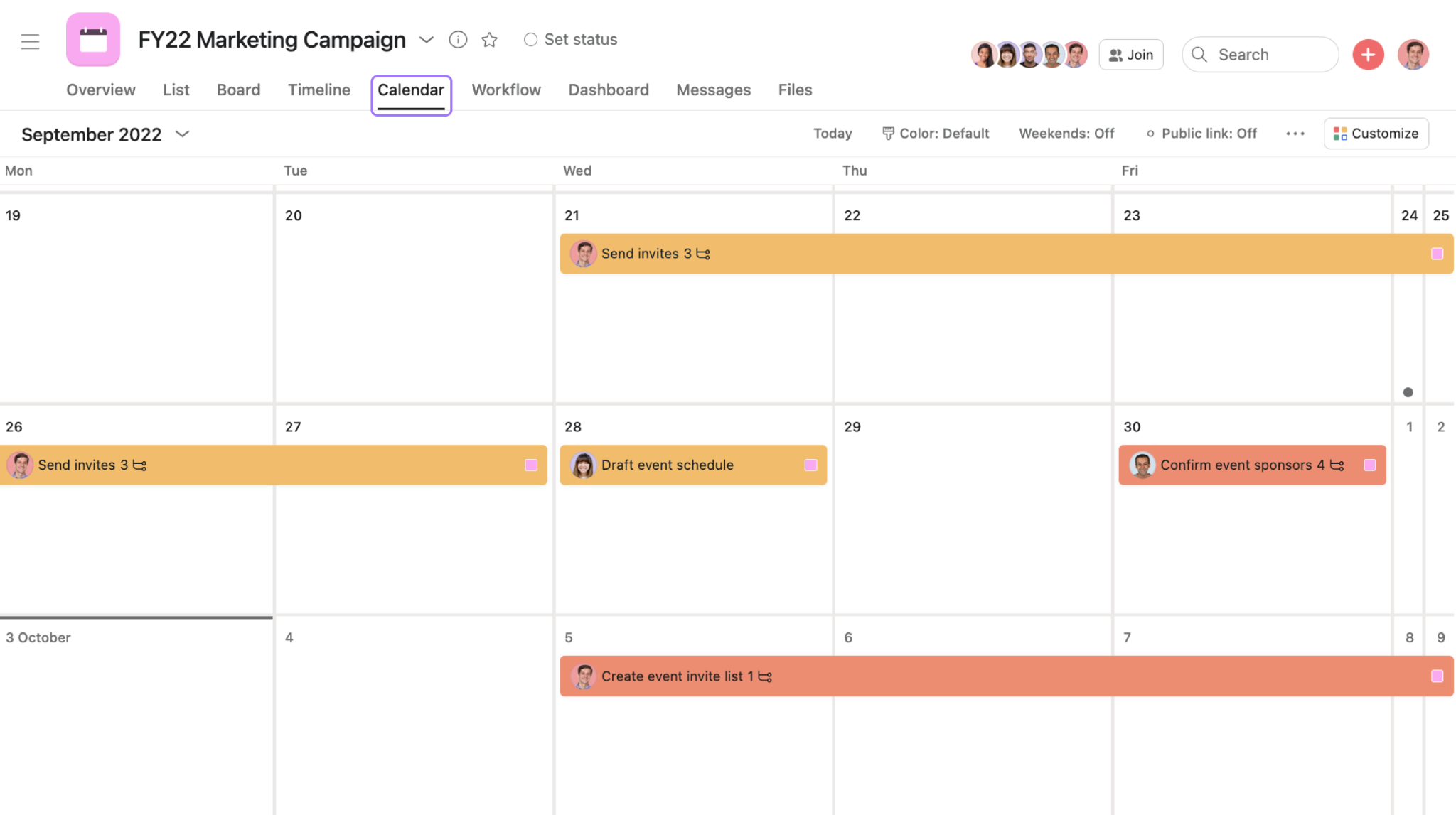
And guess what?
Asana even syncs different calendars to a unified view, making it a breeze to schedule events across your existing tech stack.
Now, here’s where the teamwork really gets its wings.
Asana allows you to delegate tasks to team members, add task notes, and designate collaborators.
The inclusion of an Inbox page makes it a breeze to create, store, and swiftly access project-related discussions involving the whole team.
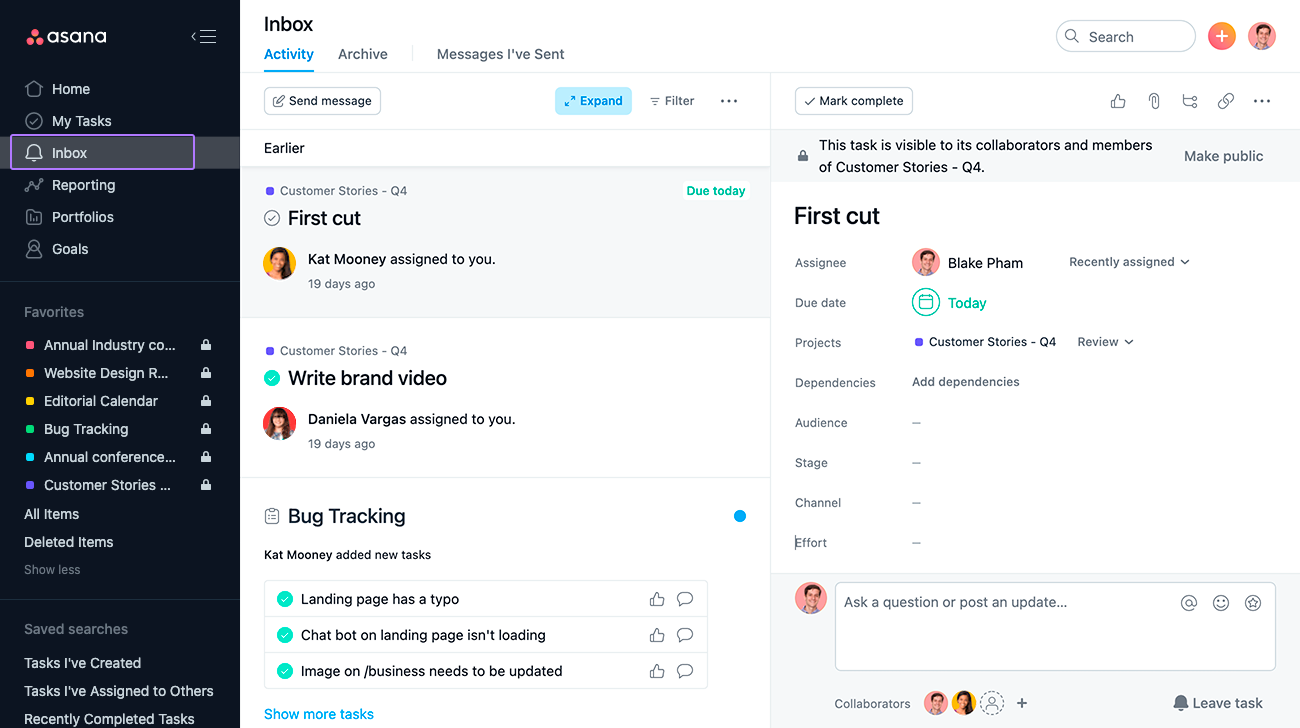
But nothing is perfect; Asana still has certain limitations.
For example, the app allows only one assignee per task at a time.
Or, its heavy focus on team collaboration scenarios might make its interface cluttered with many unused features, which causes inconvenience for individual users.
Key features
- Multiple views—List, Board, Calendar, etc.
- Various collaboration features: task notes, assignees & collaborators, Inbox, etc.
- Advanced task management: due dates, priorities, sub-tasks, dependencies, etc.
- Reporting function: dashboards, custom fields, milestones, and search (premium features)
- Unlimited number of projects, tasks, activity logs, and files.
- Various integrations to easily connect with your existing tools
Limitations
- Single assignee per task
- Complexity for simple tasks
- Lack of time tracking
Pricing
Asana offers a free version and three paid versions:

With the Enterprise version, you need to contact sales for details.
3. Sunsama
If you’re looking for apps similar to Motion, then Sunsama is certainly one to consider.
It offers many functionalities that Motion offers, including task management, time tracking, and weekly planning.
However, Sunsama distinguishes itself in several key aspects.
For instance, Sunsama excels in seamlessly integrating with various resources. Imagine you can import tasks from other project management apps, turning a cluttered assortment into an organized to-do list.
Additionally, you can sync all your calendars into a centralized place. How convenient it is!
Even in terms of shared functionalities, Sunsama surpasses Motion in various ways. Let’s delve into a few examples.
It’s faster and easier to add events or tasks in bulk in Sunsama than in Motion. All you need to do is just to press the “+Add a task” button, type the task name, and press Enter.
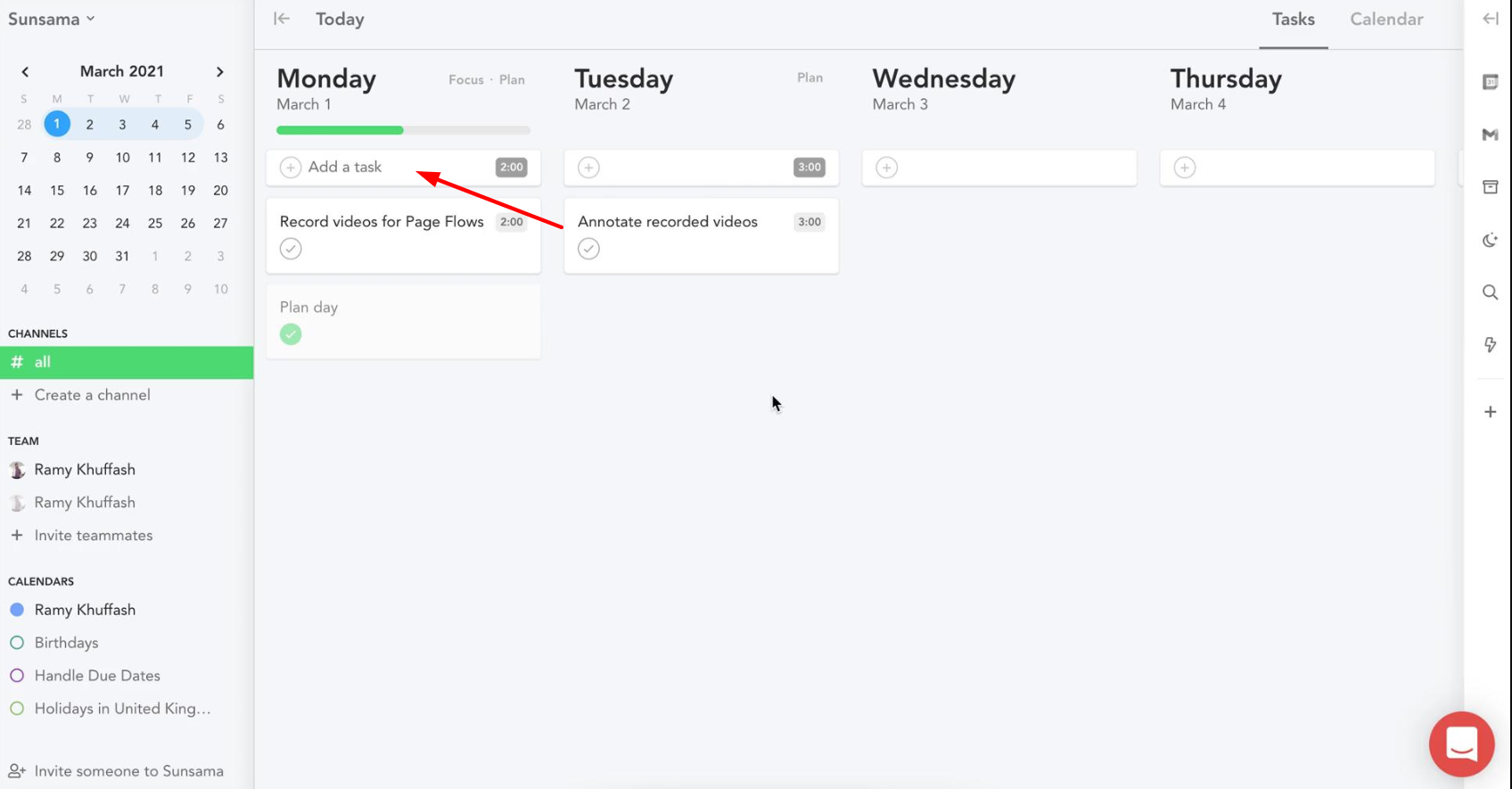
Once you’ve crafted your to-do lists, you can start editing each task’s details, such as adding notes, start and due dates, subtasks, comments, and attachments.
On the flip side, Motion necessitates entering the task’s name, priority, start and due dates, and work hours for task creation—a more intricate process.
Not to mention, this isn’t suitable for tasks with no deadlines.
Here’s another comparison:
When you want to block time for tasks on the calendar, Sunsama’s drag-and-drop feature is smoother, providing a superior scheduling experience to Motion.

This Motion app alternative is available as a mobile and desktop app, allowing you to easily manage tasks across devices.
Key features
- Daily and weekly calendar views
- Time-blocking & Pomodoro timers
- Drag-and-drop interface to schedule tasks onto the calendar
- Channels & Contexts
- “Daily ShutDown” feature
- Keyboard shortcuts
Limitations
- Cannot schedule tasks without connecting to your Outlook or Google Calendar.
- Unable to manage projects
- No free plan
Pricing
Sunsama offers two paid plans, each with a 14-day free trial.

4. Akiflow
In the Akiflow vs. Motion face-off, Akiflow shines as a robust productivity tool with distinct advantages. One of them is its remarkable team collaboration abilities.
Akiflow comes with a range of features, such as task assignments, real-time task discussions, and shared calendars.
This is particularly useful for teams aiming to keep their projects well-organized.
The best part?
This Motion app alternative allows you to schedule meetings across multiple time zones, solving the challenge of scheduling conflicts.
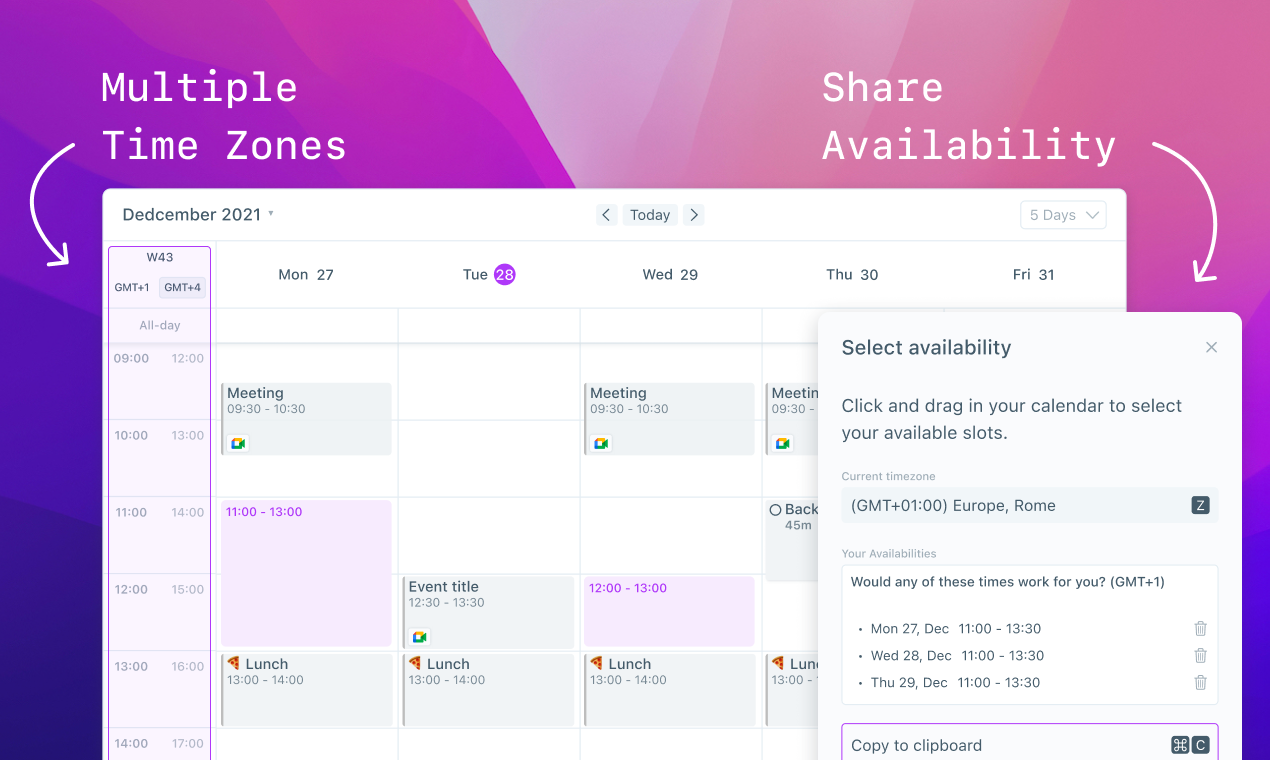
Additionally, Akiflow empowers users with natural language commands via its command bar. This means you can quickly add tasks, schedule events, and manage your to-do list without disrupting your workflow.
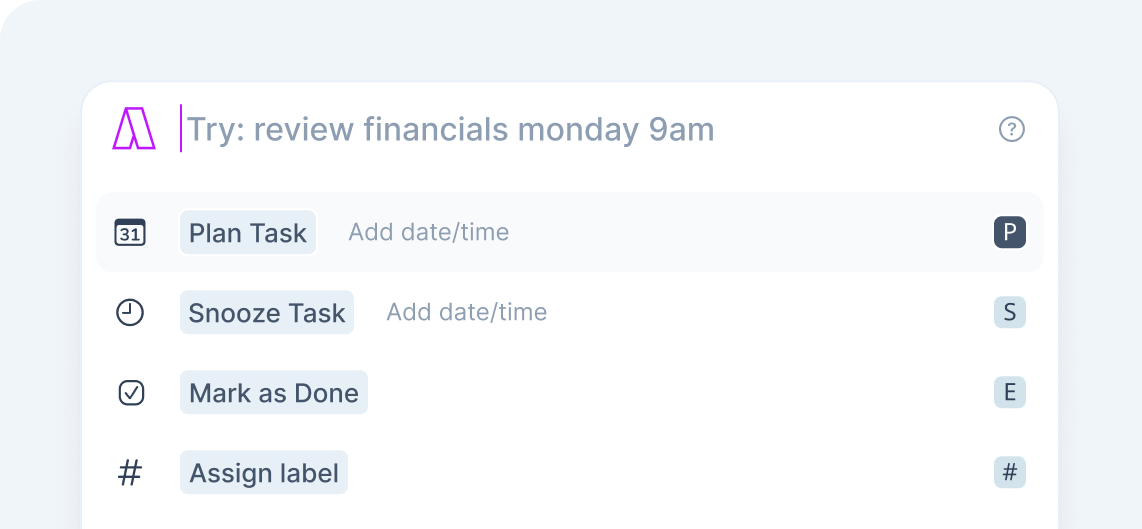
The app’s interface makes sure that your tasks, meetings, and events are neatly organized within a single calendar, bolstering team productivity.
In a nutshell, whether you’re a task manager aiming to streamline tasks or a team striving to boost productivity through enhanced collaboration, Akiflow is a compelling alternative.
Key features
- Universal Inbox
- Focus mode
- Keyboard shortcuts
- Command bar
- Ability to create time blocks of focus time
- Generate a bookable link
Limitations
- No free version
- Lack of project management tools
Pricing
The Motion app alternative offers two pricing options:
- $14.99/user per month, billed annually.
- $24.99/user per month, billed monthly.
5. Google Calendar
Google Calendar is among the apps like Motion, but it comes with a unique set of advantages.
Firstly, its interface is cleaner and navigation is smoother.
If you find Motion’s features overwhelming or unnecessary for your needs, Google Calendar’s simplicity could be the perfect fit.
The calendar app allows you to effortlessly create tasks, schedule meetings, set reminders, and track progress.
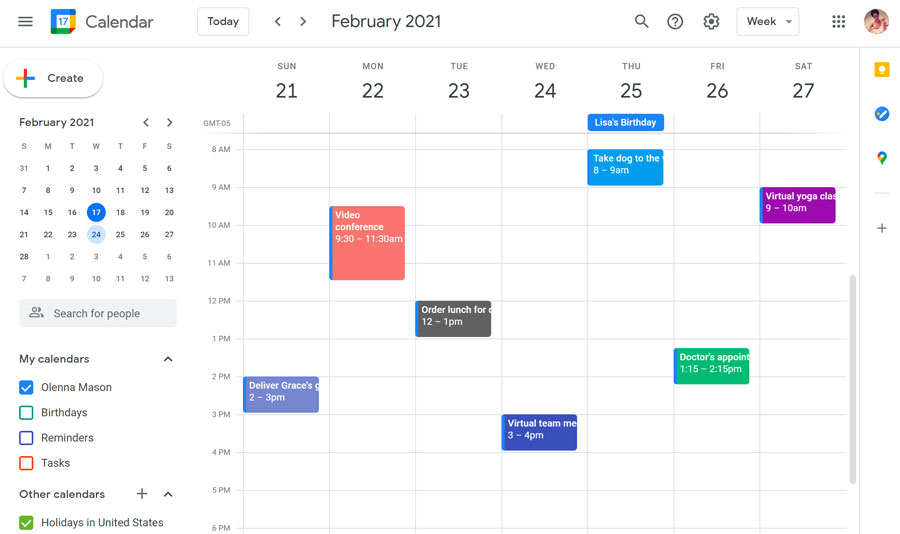
The second standout feature is its deep integration with Google Suite tools such as Gmail, Google Drive, and Google Meet. For those who heavily rely on this ecosystem, this integration is a significant boon.
To sum up, this calendar app is a great alternative to Motion, whether you’re a professional juggling multiple meetings or simply looking for a straightforward way to manage tasks and events. Its streamlined interface, integration with Google Suite, and ease of use make it a compelling choice for a variety of users.
Key features
- Clean and highly intuitive interface
- Day, week, month, and year calendar views, with hourly time slots
- Time blocking
- Support for creating multiple calendars
- Appointment schedule links
- Integration with tools of Google Suite
Limitations
- Limited integration for non-Google apps
- No built-in time tracking
- Lack of advanced functions for managing meetings
Pricing
This app is free to use.
6. Routine
Unlike Motion, Routine focuses solely on individual productivity, making it an ideal choice for those who want complete control over their personal tasks.
Routine’s concept of work management is a bit different from common productivity apps: It saves your tasks, ideas, thoughts, and objectives as notes, then organize them into pages.
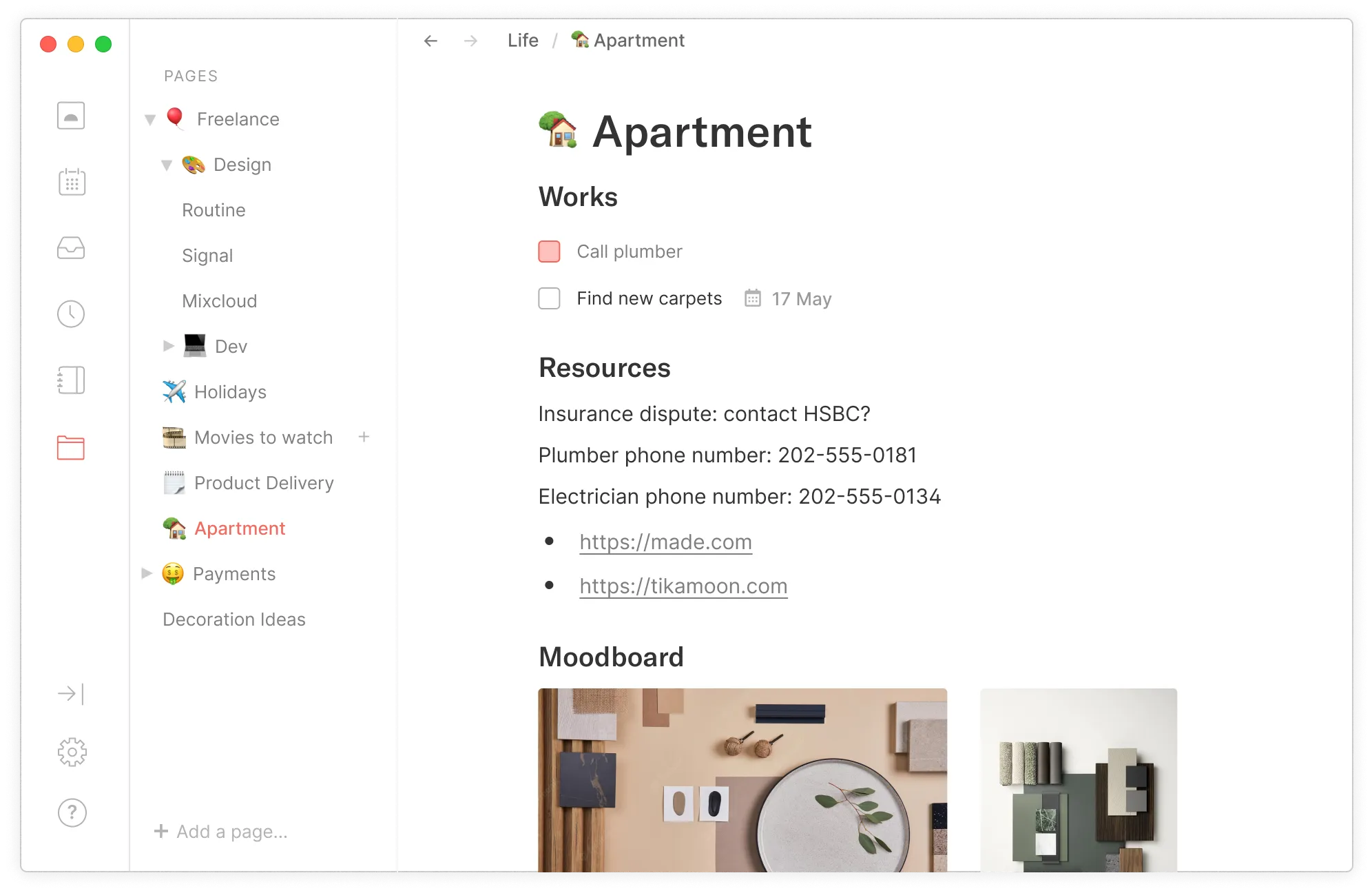
But rest assured, it’s easy to get the hang of, even if you’re not tech-savvy.
Its clean and intuitive interface makes it a breeze to add tasks, create time blocks for them, and set reminders.
The Motion app alternative also introduces an innovative feature – its “Superhuman Calendar,” which takes scheduling to a new level.
This feature allows you to manage calendars in a single place. No need to switch back and forth between multiple apps.
Additionally, its AI assistant optimizes task scheduling around your existing commitments, ensuring that no important tasks fall through the cracks.
Key features
- Notes & pages
- Universal inbox
- Time blocking
- Smart planning
- Reminders
- Keyboard shortcuts
Limitations
- Not suitable for complex project management
- Web-based only
Pricing

7. Ellie Planner
Ellie Planner takes a refreshing approach by combining your to-do list and calendar in a single user-friendly app, making it a boon for those who value manual planning without AI.
What sets Ellie apart is its simplicity.
While Motion leans on AI, Ellie focuses on delivering a beautiful and user-friendly experience.

Whether you’re planning your day or scheduling meetings, the Motion app alternative streamlines the process.
If affordability is key, Ellie shines again.
With a free plan and an economical $4.99/month pro plan, it’s an accessible choice for students, professionals, and anyone seeking a productivity tool that prioritizes an intuitive user experience over fancy AI functions.
Key features
- Labels
- Recurring tasks
- Estimated/Actural time
- “Brain Dumb” to quickly capture tasks
- Timeboxing
- Keyboard shortcuts
Limitations
- Limited free version
- Lack of complex project tracking capabilities
Pricing

8. Morgen
Like Motion, Morgen is a task management and calendar app with focus on simplicity and efficiency.
It’s perfect for individuals who seek a more streamlined approach without getting bogged down by excessive functions.
The Motion app alternative empowers you to effortlessly mark tasks on your calendar, ensuring efficient time management.
Quickly finding calendar events and participants’ availability becomes a breeze through the Universal Search function.
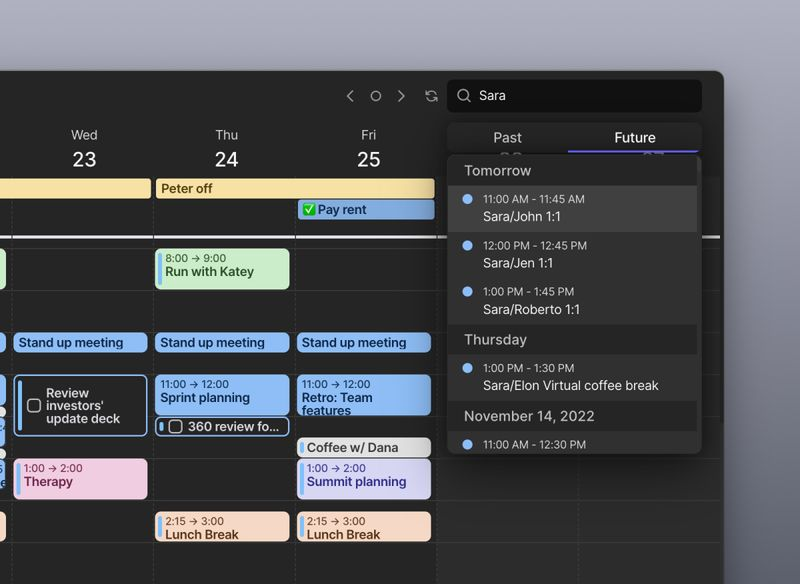
One of Morgen’s key strengths is its Meeting Scheduler, which is akin to Motion’s booking page.
This tool enables you to set up meetings effortlessly, prevent double booking, and swiftly check availability.

The desktop app format makes it an integrated part of your computer.
Ideal for those who appreciate a desktop-centric approach and prioritize productivity in a clutter-free manner, Morgen offers a streamlined interface, keyboard shortcuts, and effective meeting management.
If you’re ready to embrace a hassle-free calendar experience, Morgen is an impressive alternative to consider.
Key features
- Meeting scheduler
- Automations
- Time blocking
- Universal search
- Keyboard shortcuts
Limitations
- Limited collaboration capabilities
- Lack of advanced task management functions
- No web app
Pricing
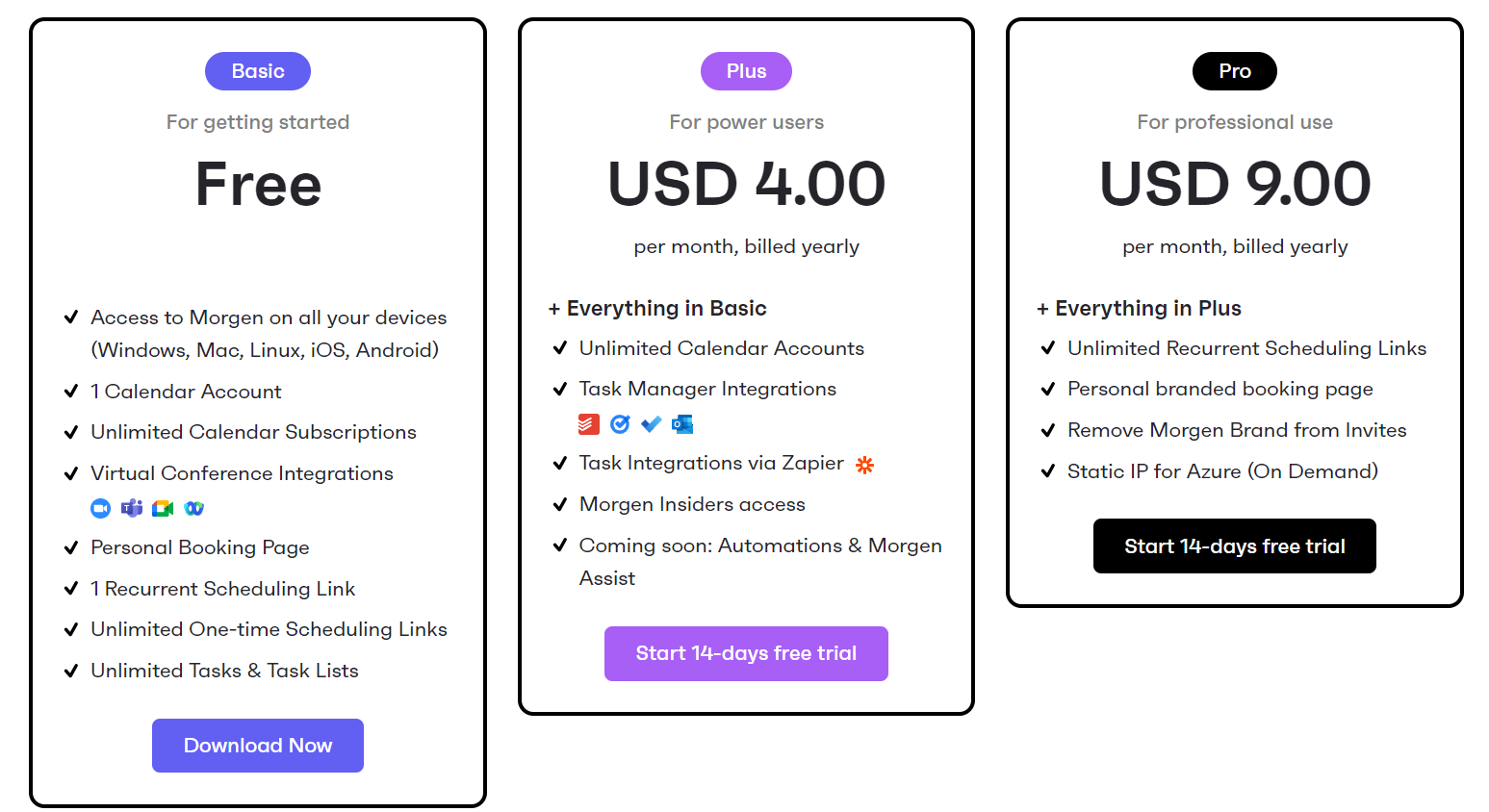
9. Fantastical
For those who prioritize a unified view of their calendars, Fantastical shines.
This is a versatile app offers a fresh approach to managing your schedule, tasks, and meetings in a visually appealing interface, enhancing productivity and organization.
Making it a standout is its intuitive event creation.
Using natural language, you can effortlessly create and manage events, adding tasks and reminders on the fly.
This ease of use extends to its task management capabilities, helping you streamline your to-do lists within your calendar.
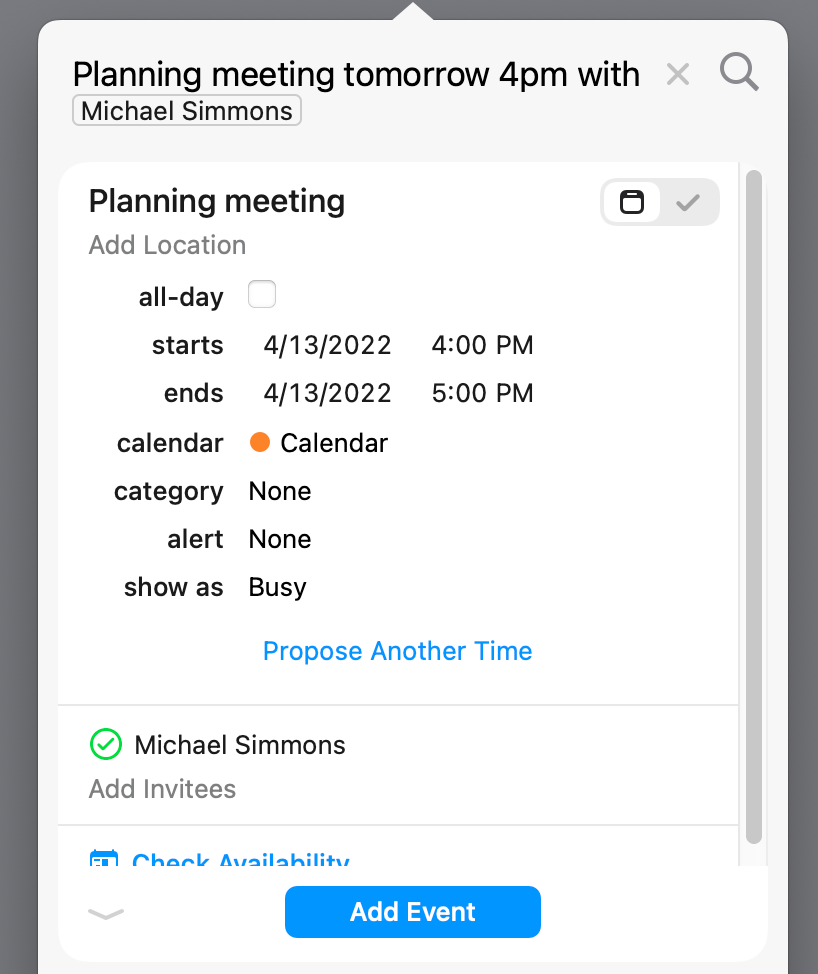
Key features
- Natural language processing
- Day, week, month, quarter, and year calendar views
- Booking links
- Multiple time zones
- Weather forecasts
Limitations
- A high learning curve
- Not robust in team collaboration capabilities
- Might not suitable for those who primarily use desktop devices for managing their workflows
Pricing
Fantastical is free to start with the limited feature package. For more features, consider one of these pricing options:
Here is the pricing for a single user or family up to 5:
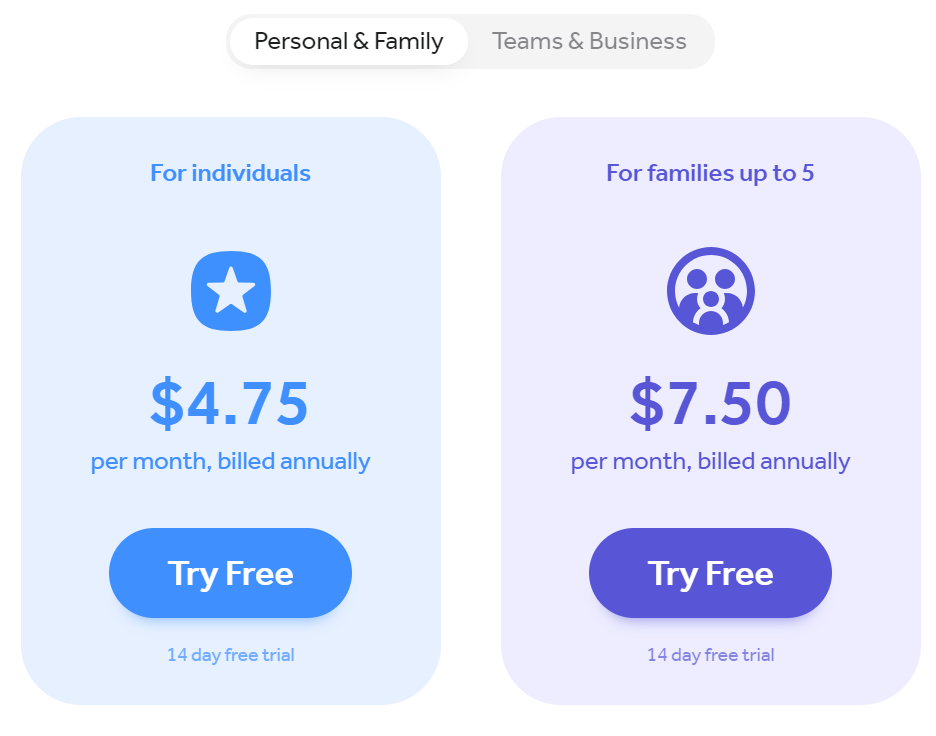
Here is the Team plan:

10. Aime.so
Aime.so is a dynamic alternative to Motion calendar.
A great choice for individuals seeking seamless control over their schedule, tasks, meetings, and contacts, hence, optimizing time management.
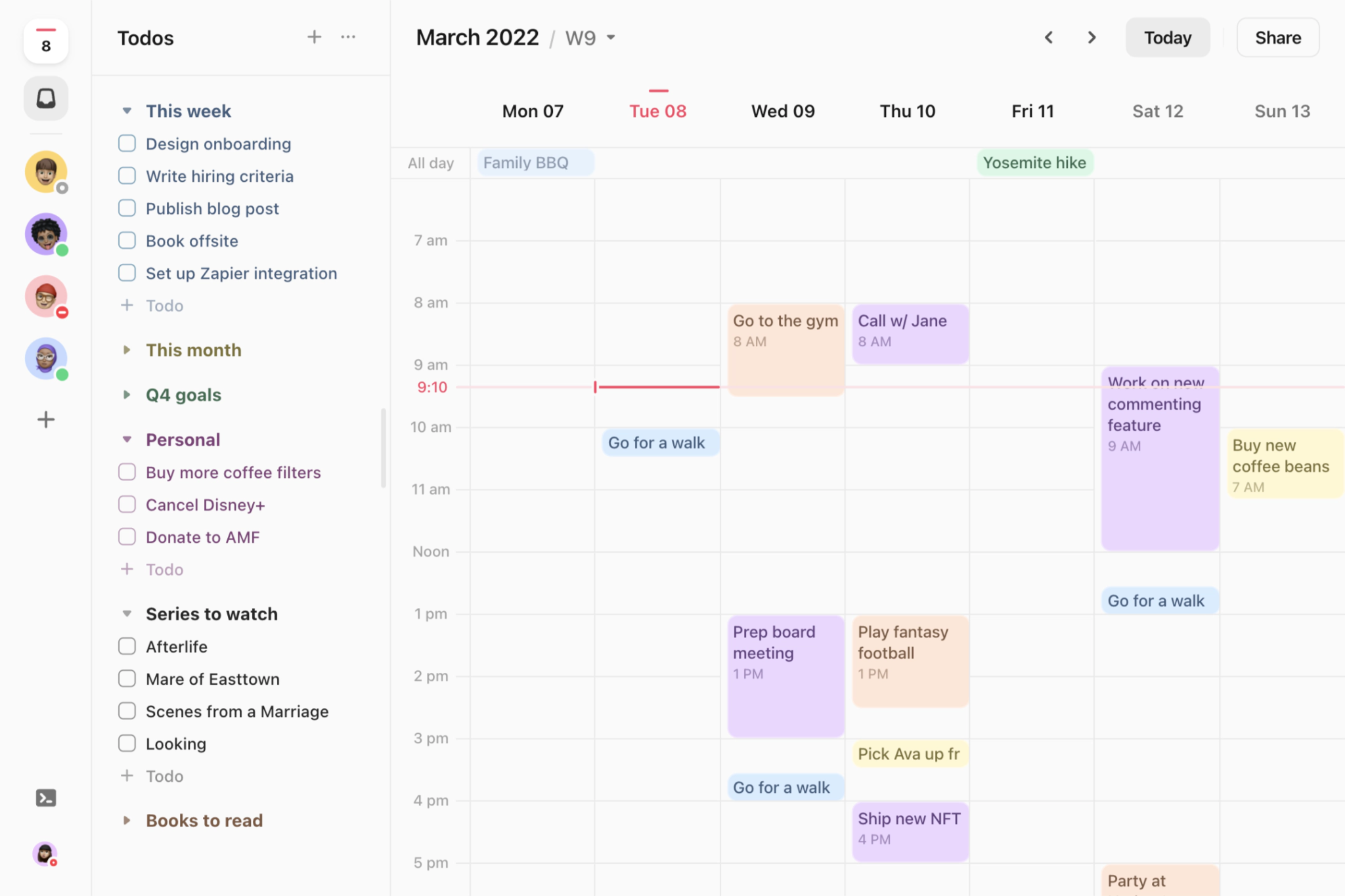
With Aime.so, you can use your calendar as a to-do list. You can create, delegate, and manage tasks, coupled with intuitive reminders. You can also pull tasks and meetings from other productivity tools into the app for a holistic view.
One notable advantage of Aime.so is its focus on collaboration.
By sharing task lists and status updates, the app facilitates effective communication among team members, fostering alignment and ensuring timely project completion.
Another distinctive feature of Aime is instantly assessing others’ availability for meetings or contacts at specific times streamlines coordination, making it an asset for efficient communication.
In short, Aime.so offers a comprehensive toolkit to enhance productivity and organization, making it a great choice for both individuals and teams.
Key features
- Color-coded weekly calendar with hourly time slots
- Share your availability with others for booking meetings
- Reminders & recurring reminders
- Keyboard shortcuts
- Notes
Limitations
- Lack of project tracking capabilities
- A bit high pricing, compared to other calendar apps
Pricing

11. TimeHero
TimeHero is ideal for those seeking an efficient way to manage tasks without the complexities of traditional scheduling.
The app stands out with its automated task management prowess.
Instead of manually juggling tasks and events, the app takes the reins by intelligently scheduling events based on their priority and deadlines. This ensures that your important events and meetings are given the attention they deserve.
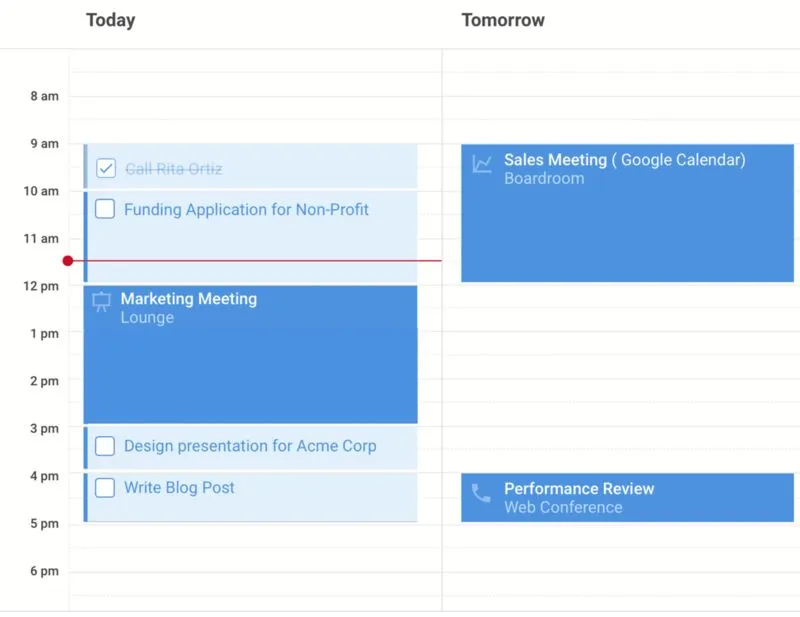
For those who value a clear and integrated schedule, TimeHero seamlessly syncs with your calendar, allowing you to create a comprehensive view of your tasks and events.
Its ability to effectively prioritize and schedule tasks brings a breath of fresh air to your daily routine, ensuring crucial events and meetings take the spotlight they deserve.
Whether you’re a professional navigating a busy work calendar or an individual aiming to enhance their time-tracking and maximize productivity, TimeHero’s automated approach can help you regain control of your time.
Key features
- Auto-planning tasks
- Timers
- Repeating tasks
- Gantt charts to easily track progress
Limitations
- The app might be overwhelming for basic users
- No free version, but just a 7-day free trial
Pricing
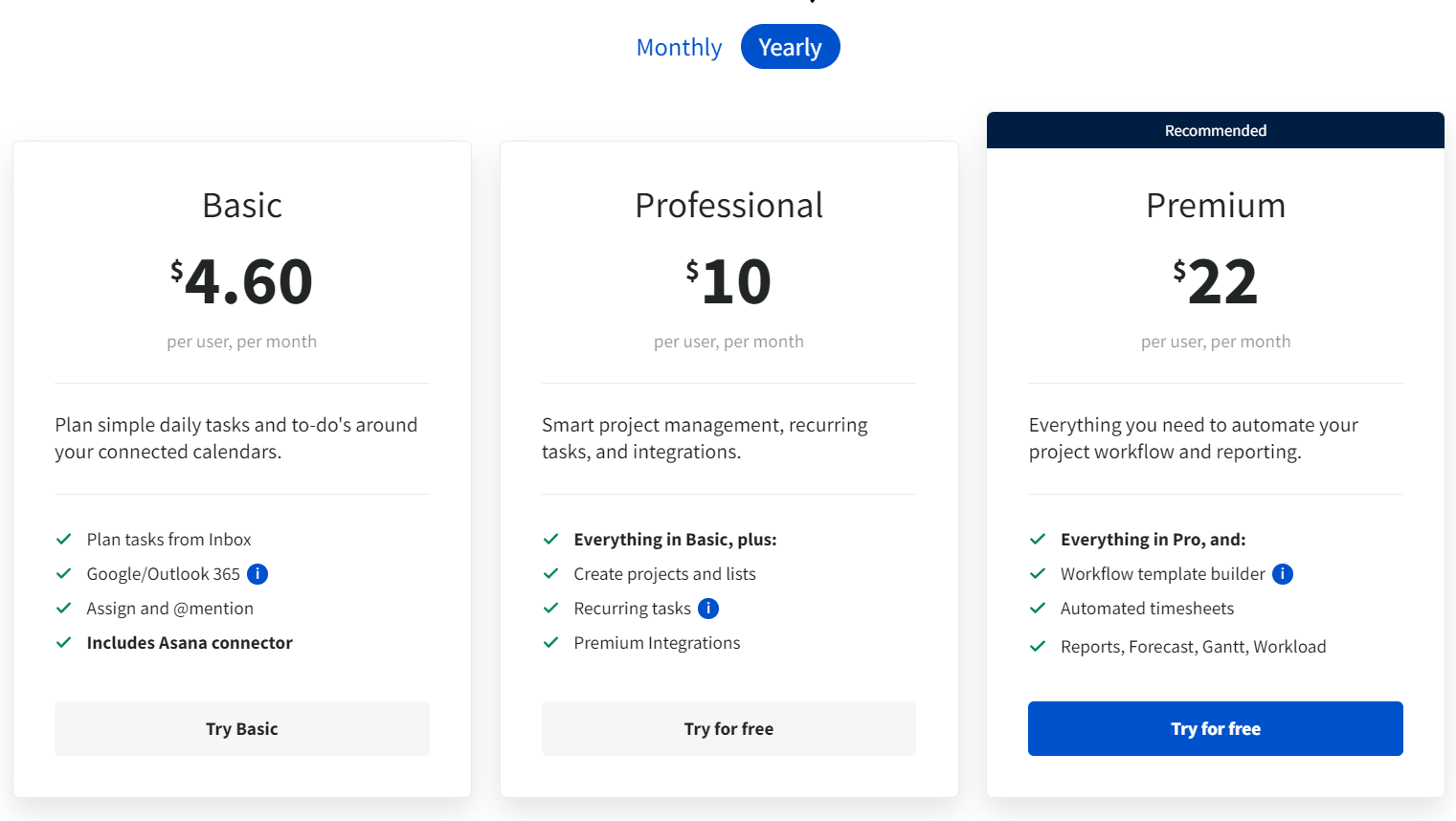
Which Motion Alternative is Best for You?
Our recommendation is Upbase—if you need one.
Upbase offers an exceptional level of flexibility, from its diverse features to its pricing structure.
It caters perfectly to your needs, whether you’re an individual user and a team, prefer monthly subscriptions.
With Upbase, you don’t need to spend hours to figure out how to use it as the layout is tailor-made to click with your brain.
The cherry on top?
You can start using this app right away without having to provide your credit card information upfront.
Ready to take the leap? Sign up for a free Upbase account today and experience the difference firsthand.
